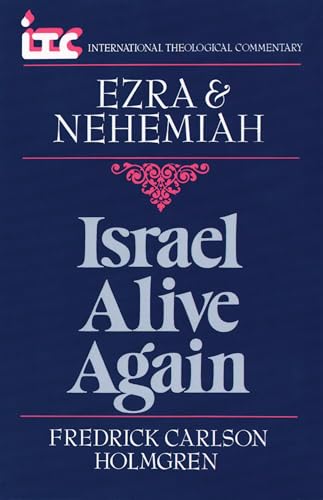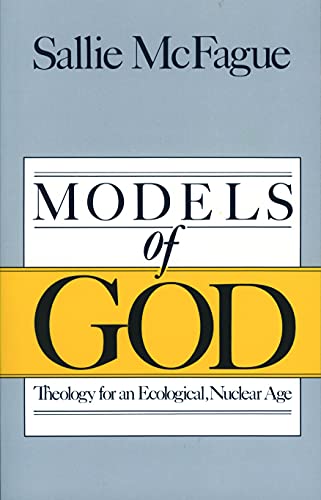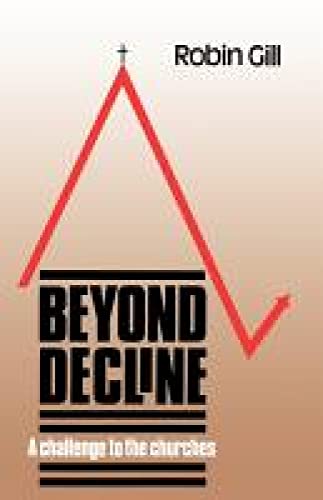Israel Alive Again: A commentary on the books of Ezra and Nehemiah
Written by F. C. Holmgren Reviewed By Martin J. SelmanMost readers of this journal will be aware that the International Theological Commentary has made an attempt to produce biblical commentaries rather different from the standard format, large or small, with which we have become familiar. Rather than emphasize the form and sources of the biblical material or analyse linguistic and historical issues, this series has taken seriously the theological challenge of the Bible, as it relates to the modern as well as the ancient world. Perhaps inevitably, the various volumes so far published have not consistently achieved their desired aim, and the two books under consideration provide contrasting examples of the different ways in which individual authors have set about their task. They also illustrate very clearly the strengths and weaknesses of the series.
One of the series’ most distinctive features has been the deliberate choice of authors from outside the traditional boundaries of Western scholarship. Graham Ogden, for example, who contributes the section on Joel but who is well known for his recent work on Ecclesiastes, has worked for some years in Taiwan, while Richard Deutsch’s Jewish ancestry is complemented by extensive experience of lecturing in Hong Kong. Here he writes on Malachi. Fredrick Holmgren, who teaches in Chicago, is one of the joint editors of the series, and his volume (on Ezra/Nehemiah) is presumably intended as a model of what the series is about. It is somewhat surprising, therefore, that, apart from occasional comments on matters such as the importance of genealogy in kinship-oriented societies or the stress placed on the value of a community’s experience of God alongside that of an individual, these volumes do not appear substantially different from those produced by Western-based authors. Perhaps biblical scholarship has been less Westernized than the editors imagine, or alternatively the contributors might not have fully freed themselves from their Western heritage (or bondage?). Or is it after all that the most vital qualification for a good biblical commentator is his knowledge of the biblical text? Although it is important for all readers of the Bible to be aware of the cultural baggage they bring to the sacred text, for a commentator it is surely a higher priority to bring out what the biblical text says to his readers and their culture rather than to emphasize what he himself brings to the Bible.
This is not to deny, of course, the value of our own cultural background, and there are two major areas in these commentaries where this comes to the fore. The Jewish dimension of exegesis is emphasized by both Holmgren and Deutsch. This is generally sensitively done, especially in discussing the mixed marriage issue in Ezra/Nehemiah for minority communities and in underlining the priority of ‘the Torah of life’. Indeed, many evangelical Christians would do well to pay attention to the positive views of OT ‘Law’ enunciated here. Deutsch shows, for example, that ‘Torah is the framework of renewal’, and for both commentators the Torah is all about the life of faith.
A rather different kind of cultural emphasis emerges in Ogden’s work on Joel. He interprets Joel as a lament liturgy, and develops this theme theologically in quite a striking manner. Noting that Christians ‘have little opportunity liturgically to pour out fears, pain, anger, and frustrations, or our doubts about God’s care’, he suggests that Christians do actually need to express such emotions to God: ‘To lament or pour out one’s despair in a context of worship is appropriate, for there we call upon a compassionate God to act against the powers that bind us. There too we hear the assurance of God’s commitment to all in need.…’ For Joel, this was part of the experience of God’s salvation, and there is no reason why it should not be the same today. The interesting thing, however, is that it is the content and significance of the biblical text that has led Ogden to this conclusion rather than his contemporary Asian context, even though, as he acknowledges, public lamentation is part of the fabric of life in his particular culture.
If, then, a commentary must in the end be judged by its ability to make plain the meaning of the biblical text, then these volumes cannot be said to have achieved uniform success. There is undoubtedly much to welcome in the theological emphases which are still all too often lacking in OT commentaries. Holmgren, for example, has helpful treatments of the theme of providence, and of the importance of forms and institutions as a means for remembering and celebrating the great acts of God, while Ogden highlights the fact that God’s plans for blessing involve a reversal of evil’s onslaught and that Joel’s key message is that God will indeed ‘restore the years’. Similarly, it is good to be able to welcome the awareness that the NT can be taken seriously in OT commentating, a feature that is still rare enough for its appearance to be worth noting. Although the more traditional literary and historical issues are dealt with more briefly, it is good to see an attempt made to treat Nehemiah 8–10 seriously in its own context without it having to be transplanted elsewhere, and Ogden adduces sound arguments concerning the unity and structure of Joel.
On the other hand, however, one has to question Holmgren’s repeated statements about chronological slips in the text, and especially the way in which he sets Isaiah 56–66 against a range of biblical authors (including Ezra/Nehemiah) on the question of the temple. One may legitimately recognize the existence of varied views in the Bible without taking the views of Hanson and others to the extreme of seeing the supporters of Ezra/Nehemiah, etc. as those who have cast out the author of Isaiah 66:5–6 and his disciples and been regarded by the latter as God’s enemies (Is. 66:6). Holmgren would have done better to have taken his own advice ‘not to exaggerate the divisions’, especially as we know comparatively little about the post-exilic community. A question mark must also be raised about Ogden’s description of the NT’s use of the OT simply ‘free quotation’, or his view of the early church as merely claiming ‘equality with the synagogue as inheritors of the true faith’. In discussing Malachi 1:11, Deutsch, too, seems to be oversensitive to non-Christian religious groups in his desire to see evidence of the kingdom of God in their efforts ‘to make this world a better place to live in’, albeit according to their own beliefs. Jesus’ acknowledgment of the Roman centurion’s faith is hardly an appropriate analogy—in his case, the whole point was that he put his faith in Jesus as Lord.
It is precisely this kind of theological comment, rather loosely related to the biblical text, that will diminish somewhat the usefulness of these otherwise stimulating volumes. The contributions of Holmgren and Deutsch tend at times to have the nature of a collection of brief essays on points of theological interest, resulting in a very brief treatment of many issues (e.g. the nature and value of sacrifice in Mal. 1:6–14). This reviewer found Ogden’s work the most valuable of the three simply because it took the content of the text more seriously, and managed to do so without going into vast detail or losing its appeal for the non-scholarly reader. In short, even in the search for relevance and theology in the OT, there is no substitute for exegesis.
Martin J. Selman
Spurgeon’s College, London







